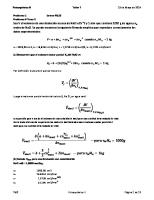Physical Properties of Food Problems and Solution
Physical Properties of Food 1- Wheat flour is made by grinding the dry wheat grains. Particle size is an important char
Views 111 Downloads 1 File size 239KB
Recommend stories
- Author / Uploaded
- Mohamed
Citation preview
Physical Properties of Food
1- Wheat flour is made by grinding the dry wheat grains. Particle size is an important characteristic in many of the wheat products. For example, in making wafers, if the flour is too fine, light and tender products are formed. On the other hand, incomplete sheets of unsatisfactory wafers are formed if the flour is too coarse. Therefore, it is important to test the grinding performance of flour by sieve analysis in wafer producing factories. Determine the volume surface mean diameter, mass mean diameter, and volume mean diameter of wheat flour by differential analysis using the data given in Table E.1.3.1.
Solution: Mesh 8/10 10/20 20/32 32/42 42/60 60/80 80/100 100/Pan
Quantity 1.98 11.69 4.51 1.20 2.43 0.63 0.69 1.47
Mass Fraction Retained 0.080 0.475 0.183 0.049 0.099 0.026 0.028 0.060
D pi 2.007 1.242 0.664 0.423 0.299 0.211 0.161 0.074
(D Pi) ^ 3 8.07 1.91 0.29 0.07 0.026 0.0092 0.00417 0.000389
2- The porosity of dried apples was measured using an air comparison pycnometer with two identical chambers (Fig. 1.9). The dried apple sample was placed in chamber 2. Valves 2 and 3 were closed and air was supplied to chamber 1. Valve 1 was closed and pressure P 1 was read as 0.508 atm. Then, valve 2 was opened and the new equilibrium pressure, P 2 , was read as 0.309 atm. Calculate
the porosity of the dried apple.
Solution: P1 = 0.508 P2= 0.309 P1V1 = P2V1 + P2Va2 ∑ = Va2 / V1 = (P1-P2)/P2 ∑= (0.508-0.309)/ 0.309 = 0.644 ……………………………………………………………………………………………………………………………………………………………….... 3- Two parallel plates are 0.1 m apart. The bottom plate is stationary while the upper one is moving with a velocity V (Fig E.2.2.1). The fluid between the plates is water, which has a viscosity of 1 cp. A-
Two Parallel plates are : 0.1 m The Viscosity = 1CP = 1X10^-3 = 0.001 Pa. s The Velocity= 0.3 m/s
Τyx = Τyx= -1X10^-3 X (0-0.3)/(1-0) = 3X10^-3 Pa. s B- The Viscosity = 100 CP = 0.1 Pa. s 0.003 = -0.1 X (0-V)/(0.1-0) V= 0.003 4- To determine the viscosity of sunflower oil, a falling ball viscometer was used. Viscometer has a tube length of 10 cm and its ball has a diameter of 0.68 mm. Oil and the ball have densities of 921 kg/m 3 and 2420 kg/m 3 , respectively. If it takes 44.5 s for the ball to fall from the top of the tube, calculate the viscosity of the oil.
Length = 10 CM = 0.1 Diameter = 0.68 mm = 6X10^-4 Density of oil = 921 Kg/m
2
Density Of Ball = 2420 Kg/m
3
Time = 44.5 S Vt = L/t = 0.1/44.5 = 0.0022 m/s
µ=
µ=
………………………………………………………………………………………………………………………………………………………………… 5- Cherry has a moisture content of 77.5% (wb). The apparent and bulk densities are 615 kg/m 3 and 511 kg/m 3 at 25◦C, respectively. Assuming cherry contains only carbohydrate and water, calculate the total porosity of cherries when stacked as bulk. The densities of carbohydrate and water are 1586 kg/m 3 and 997 kg/m 3 , respectively. Moisture Content: 77.5% = 0.775 Solid Content = 22.5% = 0.225
ρT = ρT = 1/ ( 0.775 / 997 ) + ( 0.225 / 1586 ) ρT= 1087.9 kg / m 3
εapp =
= 1- 615/1087.9 = 0.434
εbulk =
= 1- 511 / 615 = 0.169
Total porosity = εTotal = εbulk + εapp εTotal= 0.169 + 0.434 = 0.60 ………………………………………………………………………………………………………………………………………………………………… Rapeseeds are commonly used for volume measurement of baked goods. In a bakery, first the bulk density of rapeseeds was determined by filling a container of 100 g weight and 1000 cm 3 volume uniformly with rapeseeds through tapping and smoothing the surface with a ruler. The weight of the container filled with rapeseeds after constant weight was reached was 750 g. Then, the volumes of the muffins were measured at different baking times using rapeseeds before and after compressing the pores using a 1000 N load cell and the experimental data are given in Table E.1.7.1. Calculate the porosity of muffins during baking. How does it change during baking? Explain the reason. Solution: W Container = 100 g > 1000 Cm3 W Container + Seed = 750g 1- ρ Seeds = W Seeds / W Container = 750 – 100 / 1000 = 0.65 Cm 3 in 10 min Before pressure 2- V Sample = V Container – W Seeds / ρ Seeds = 1000 – ( 731 – 34 – 100 ) / 0.65 = 81.53 Cm3
In 10 min after compression V Sample = V Container – W Seeds / ρ Seeds = 1000 – ( 744-34-100 ) / 0.65 = 61.5 Cm 3
In 20 min Before compression V Sample = V Container – w Seed / ρ Seeds 1000 – ( 718 – 30 – 100 ) / 0.65 = 95.38 Cm 3 After compression 1000 – ( 752 – 30 – 100 ) / 0.65 = 43.0 Cm3 εapp = 1- Vs / V app = 1- ( 43.0 / 95.38 ) = 0.54 Cm3 in 30 min Before: 1000 – (704 – 28 – 100 ) / 0.65 = 113.8 Cm3 After : 1000 – ( 758 – 28 -100 ) / 0.65 = 30.7 Cm3 Εapp = 1- Vs / V app = 1- (30.7 / 113.8 ) = 0.73 Cm 3









